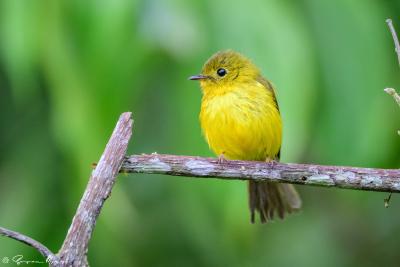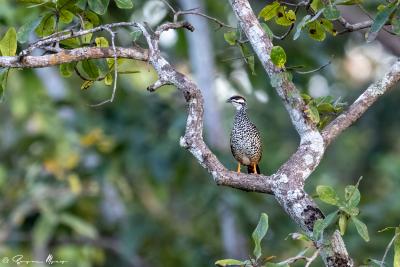Borneo: Sabah
Mount Kinabalu, Kinabatangan River, Tabin Reserve, and the Danum Valley
-
Jun 18 to Jul 3 2026
Susan Myers
Tour Price to be Determined
Tour Price to be Determined
Borneo is quite rightly regarded as one of the great storehouses of our planet’s incredible biological diversity. Charles Darwin’s famous description, “one great, wild, untidy, luxuriant hothouse made by nature herself,” although often said incorrectly to have been inspired by Borneo, is, in fact, perfect for Borneo. Although much of the rich and verdant rainforest has been lost to palm oil plantations and timber companies, the Malaysian state of Sabah in the north harbors large remaining tracts of lowland and montane rainforest. The towering spinal mountain range dominated by Mount Kinabalu emanates from here, and teeming, complex rainforests fan out below to the lowlands and ultimately to the coast. The wildlife of this remarkable island is incomparable. With a host of enticing birds (including 48 endemics), a charismatic mammal fauna, many strange and unusual reptiles, and the world’s most diverse collection of carnivorous pitcher plants, it’s not surprising that naturalists are irresistibly drawn to the island.
We’ll visit the four major birding and wildlife sites: Mount Kinabalu, the Kinabatangan River, Tabin Wildlife Reserve, and Danum Valley. Mount Kinabalu is one of those truly memorable mountains that seem to burst from the ground. It dominates the west coast and is pivotal to the identity of the local people. The cool montane forests on the slopes of Kinabalu and the surrounding Crocker Ranges are home to most of Borneo’s endemic species. By contrast, the meandering passage of the lazy Kinabatangan River feeds the low-lying swamp forests that harbor rambunctious troops of the unlikely Proboscis Monkey, herds of gentle Bornean elephants, and a vast array of wonderful birds including eight species of hornbill and the strange Bornean Bristlehead. Our chances of seeing the amazing red ape—truly wild Bornean Orangutan—are high here. Next, we’ll travel to the lowland forest of Tabin Wildlife Reserve in the island’s east. One of the highlights of Tabin are the active and mineral-rich mud volcanoes, which attract wildlife for their mineral intake and present an ideal platform for wildlife observation and bird watching. To complete the picture, we’ll travel to the remote Danum Valley, one of the largest remaining stands of primary forest in Borneo, where luxuriant forests host a dazzling cast of pittas, babblers, trogons, barbets, broadbills, and many, many other fabulous birds and other animals.
Day 1: The tour begins this evening in Kota Kinabalu. Night in Kota Kinabalu.
Day 2: We’ll depart Sabah’s capital city, known locally as KK, and almost immediately find ourselves climbing in altitude as we head toward the Crocker Ranges and the impressive massif of Mount Kinabalu.
The area of the Crocker Range National Park we pass through is at a slightly lower altitude than Mount Kinabalu and is a good place to locate a handful of endemics and other specialties that are difficult to find at Kinabalu. With a little luck, we may encounter the monotypic Mountain Blackeye in addition to Mountain Barbet and the rather uncommon but attractive Bornean Barbet. If we’re a bit more fortunate, we may also see the peculiar Whitehead’s Spiderhunter or the diminutive Pygmy White-eye our first Bornean endemics! Some of the other birds we may encounter include Jerdon’s Baza, Mountain Imperial-Pigeon, Ruddy and Little Cuckoo-doves, Gold-whiskered Barbet, Bornean Leafbird, Pale-faced Bulbul, Orange-headed Thrush (uncommon), and the flaming Temminck’s Sunbird. Night at Tambunan.
Days 3-5: Mount Kinabalu is so central to the identity of Sabahans that it is featured prominently on the state flag and is the subject of innumerable folktales. It is also the key to Borneo’s incredible biodiversity, for it’s here in these mountain ranges that most of Borneo’s endemics evolved. Birding in the cool climate and verdant forests is a real pleasure as we stroll the trails and road in search of a host of great birds, including Bornean Whistling-Thrush, Bornean Whistler, Mountain Serpent-Eagle, the rather elusive Whitehead’s Trogon, Golden-naped Barbet, Checker-throated and Maroon Woodpeckers, the fabulous Whitehead’s Broadbill, Sunda Cuckoo-shrike, Grey-throated Minivet, Ashy and Hair-crested Drongos, Black-and-crimson Oriole, Short-tailed Green Magpie, Bornean Treepie, the delightful Mountain Wren-Babbler, Grey-throated Babbler, Sunda, Chestnut-capped, and Bare-headed Laughingthrushes, White-browed Shrike-Babbler, large flocks of Chestnut-crested Yuhina, Mountain Leaf and Yellow-breasted Warblers, Mountain Tailorbird, Sunda Bush-Warbler, White-throated Fantail, the endemic Eye-browed Flycatcher, plus Indigo, Snowy-browed, and Little Pied Flycatchers, Bornean Whistler, Black-sided Flowerpecker, and Black-capped White-eye. There is always the possibility we could encounter some of Kinabalu’s more elusive species such as Red-breasted and Crimson-headed Partridges, Fruithunter, Everett’s Thrush, and Bornean Stubtail.
We’ll also visit Poring Hot Springs, part of the Mount Kinabalu National Park but at a lower altitude than Mount Kinabalu, and with a different set of birds; we may see Bornean Banded Kingfisher, Orange-bellied Flowerpecker, Short-tailed Babbler, Malaysian Blue-Flycatcher, Rufus Woodpecker or Bornean Spiderhunter. If we're lucky, we might spot the very rare and elusive Hose’s Broadbill. In addition, there’s a chance we’ll see a Rafflesia in flower. Nights at Mount Kinabalu.
Day 6: After a last birding session in the Mount Kinabalu National Park, we will return to our hotel to pack up and depart for the drive to Sepilok on the east side of the island. After lunch enroute at the lovely Sabah Tea Plantation, we will arrive at our lodge in the midafternoon and head to the nearby Rainforest Discovery Centre to begin our explorations of the lowlands (time permitting). We’ll head to the RDC again in the morning where we’ll station ourselves on the incredible canopy walkway to observe the forest as it wakes. The afternoon is reserved for a visit to the nearby Sun Bear Conservation Centre and, optionally, to the Orang Utan Rehabilitation Centre. Later in the evening, we will join a local naturalist for a night walk where with luck we will encounter the remarkable Horsfield’s Tarsier, the world’s smallest primate, as well as possibly seeing Barred Eagle-Owl or the bizarre Oriental Bay Owl. Night at Sepilok Forest Edge Resort.
Day 7: After some morning birding at Sepilok we’ll head south to the Kinabatangan River, Sabah’s longest. The reserve protects many excellent birds such as Lesser Fish-Eagle, Oriental Darter, Wallace’s Hawk-Eagle, Rhinoceros Hornbill (always a big hit), Stork-billed Kingfisher, and maybe we’ll see soaring Lesser Adjutants or, even better, the very rare Storm’s Stork. On our way to our lodge, we’ll stop in at Gomantong Cave, a huge limestone cavern that is home to literally millions of swiftlets and bats. The nests have been collected sustainably for the food industry in China for hundreds of years, and it’s quite a spectacle to witness the emergence of staggering numbers of swiftlets at dusk, especially when they are being pursued by Bat Hawks and Peregrine Falcons! Night at Bilit Rainforest Lodge.
Day 8: Today we’ll explore this fascinating area with its wide central river and many narrower, meandering tributaries. These forests are simply full of kingfishers, hornbills, broadbills, bulbuls, and many others. It’s a wonderful place for primates with numerous large troops of the Proboscis Monkeys as well as Maroon Leaf-Monkeys, and Long-tailed Macaques conspiring to keep us entertained. There are many, many birds to look for here, but of particular note are the special ones, such as Bornean Ground-Cuckoo, Scarlet-rumped Trogon, Hooded Pitta, and many species of kingfisher and woodpecker. This is one of the best places for Bornean Pygmy Elephant and with luck, we might come across a herd of 50 or more cavorting in the river. Night at Bilit Rainforest Lodge.
Day 9: We’ll head next to our birding destination in Tabin Wildlife Reserve. Our lodge is nestled in the midst of the rainforest, and we’ll have plenty of opportunities to spot some of Borneo’s special lowland species – both birds and mammals. Bornean Gibbons are often quite confiding here and Blue-banded Kingfisher can sometimes be found in the adjacent river. We’ll also do a night drive in search of nocturnal animals such as Leopard Cat, Colugo, or Red Giant Flying Squirrel. With luck, we may find Brown Wood-Owl or Bornean Tarsier. Night at Tabin Wildlife Resort.
Day 10: We’ll have a full day to bird this very rich area. Our birding will mostly be along the roads and we’ll use the reserve’s open jeep to explore. The greater openness of the forest at Tabin makes some birds easier to see than in the Danum Valley, especially raptors, hornbills, and canopy flock species. We’ll spend some time on the Mud Volcano Trail where the mineral sources often attract mammals and some birds as well. Tabin is one of the best places to find the unusual Bornean Pygmy Elephant, a subspecies of Asian Elephant, and the even more elucsive Asian buffalo or Banteng. Over 300 species of birds have been recorded from Tabin so we’ll be busy! Night at Tabin Wildlife Resort.
Day 11: After a final morning of birding at Tabin, we’ll proceed overland to the famed Danum Valley in Borneo’s heartland. There is no doubt that Danum Valley represents one of the most important, not to mention magnificent, nature reserves in Asia. The luxuriant forest simply brimming with amazing wildlife, although, as with most lowland tropical rainforests, finding some of this elusive wildlife can be a challenge. Enroute to our lodge, there is a chance for some good birding too. We’ll spend the next four nights at Borneo Rainforest Lodge, located on a bend in the Segama River, where the nights are cool and there is a notable absence of biting insects. This is one of the most delightful lodges in Asia, or anywhere for that matter, and there is the added bonus of some great wildlife viewing opportunities right on our doorstep. Night at Borneo Rainforest Lodge.
Days 12-14: We’ll need every day here to find and enjoy the amazing array of birds in this wonderful area. We’ll spend much of our time birding along the quiet entrance road to the lodge, as well as entering the rainforest on the well-maintained trails in search of more elusive ground dwellers.
The list of birds we’ll be searching for is impressive and exciting: Bat Hawk; Jerdon’s Baza; Bornean Crested Fireback; Great Argus; Thick-billed Green-Pigeon; Blue-crowned Hanging-Parrot; Banded Bay Cuckoo; five species of malkoha; spectacular Diard’s and Red-naped Trogons; deep forest-dwelling Rufous-backed Dwarf and Rufous-collared Kingfishers; the totally bizarre Helmeted Hornbill; many species of barbet; Rufous Piculet; up to ten species of woodpecker; Blue-headed and Black-and-crimson Pittas—two of the most beautiful members of this notoriously difficult-to-see family; Green Broadbill; the endemic Black-throated Wren-babbler (Danum Valley is a babbler lover’s heaven!); the shy Crested Shrike-jay; Bornean Black Magpie; and Long-billed Spiderhunter, to name but a few.
We’ll also make a special effort to find some of Borneo’s most elusive specialties, such as Sabah Partridge, the spectacular endemic Bornean Ground-Cuckoo, Oriental Bay Owl, Blue-banded Pitta (all three elusive and rare…), Bornean Wren-Babbler, and with a bit of luck the incomparable Bornean Bristlehead.
On at least one evening we’ll take an extended night safari from the lodge along the entrance road in search of mammals and nightbirds. We usually encounter Sambar Deer, Giant Red Flying-Squirrel, and Buffy Fish-Owl, but there is always a possibility of some scarcer creatures such as the unlikely-looking Malayan Colugo, Bornean Tarsier, Banded Linsang, Gould’s, and Large Frogmouths, Brown Wood-Owl, and Bornean Pygmy Elephant. Nights at Borneo Rainforest Lodge.
Day 15: This morning we’ll cap off our birding at Danum Valley with an early morning stroll along the road and perhaps something incredibly rare and exciting. We’ll then drive back out through the forest and logging concession and eventually back to so-called civilization for our short return flight to KK. This evening we’ll enjoy a farewell dinner together, where we’ll reflect on a fabulous trip to one of the world’s greatest birding destinations! Night at Kota Kinabalu.
Day 16: Participants can depart from Kota Kinabalu any time this morning.
Note: The information presented below has been extracted from our formal General Information for this tour. It covers topics we feel potential registrants may wish to consider before booking space. The complete General Information for this tour will be sent to all tour registrants and of course supplemental information, if needed, is available from the WINGS office.
ENTERING MALAYSIA: U.S. citizens are required to have a passport valid for at least six months. No visa is required for stays of less than 90 days. Residents of other countries should contact their nearest Borneo embassy or consulate
COUNTRY INFORMATION: You can review the U.S. Department of State Country Specific Travel Information here: https://travel.state.gov/content/travel.html. Review foreign travel advice from the UK government here: https://www.gov.uk/foreign-travel-advice and travel advice and advisories from the Government of Canada here: https://travel.gc.ca/travelling/advisories.
HEALTH: The Centers for Disease Control (CDC) recommends vaccinations for Hepatitis A or immune globulin (IG) and for typhoid. Typhoid vaccination is particularly important because of the presence of S. typhi strains resistant to multiple antibiotics in this region. Further recommended (if necessary) are booster doses for tetanus-diphtheria and measles, and a one-time dose of polio vaccine for adults.
Yellow Fever: The CDC does not recommend Yellow Fever protection. Malaysia may require proof of protection if you arrive from a country where the disease is endemic.
Malaria: The CDC recommends Malaria protection. Please consult your physician.
Insects and Leeches: There will be some mosquitoes in the forest areas, and possibly a few ticks. We recommend using insect repellents with a high concentration of DEET. However, care must be taken to avoid getting the DEET repellent on optical equipment as DEET dissolves rubber and plastic and can damage coated lenses. Camping supply stores and outfitters carry some reasonably effective alternatives, which contain natural products and aren’t corrosive.
Leeches can be quite numerous in some years but are easily repulsed with an all-purpose insect repellant such as noted just above.
PACE OF THE TOUR: The average distance covered during our days in the field is a bit more than a mile per “birding period.” Our pace is very slow, of course, but on some days we may walk up to two and a half miles per birding session. Since there is a lull in the bird activity in the middle of the afternoon, midday breaks are usually scheduled. The mornings will be early, mostly with 5:30 AM breakfasts and departures at about 6.00 AM from the hotel. Most of our birding will be on foot, often with the vehicles following us at half hour intervals. A lot of our birding will be roadside birding except during our stay at Bilit, where we will be birding from small boats. In order to find the more skulking birds such as pittas, partridges, babblers and so on we will also be birding on narrow forest trails at times. These trails are not paved and may be slippery or “rooty.” Where possible we will be walking on a downhill trend but of course the trails undulate so some uphill walking is required.
We will generally take breakfast at or before dawn. Our proximity to the equator means the days are 12 hours long year-round so dawn and dusk are around 6 am/pm respectively. Evening owling is offered where possible for those who want to participate. Most of the trails are undulating, and steep but short uphill climbs are necessary in some places. Susan will inform the group of trail conditions ahead of time so that anyone who wishes to opt out has that opportunity.
FOOD: The food in this part of Malaysia is generally delicious and varied with a combination of Chinese, Western and local Malaysian and Sabahan dishes. At the lodges the evening meals are in the form of buffets. The food in this part of the world has a reputation for being spicy but in Malaysian cuisine, chili or “sambal” (similar in some ways to salsa) is usually added to the meal at the table and the spicy elements are thus optional.
Food Allergies / Requirements: We cannot guarantee that all food allergies can be accommodated at every destination. Participants with significant food allergies or special dietary requirements should bring appropriate foods with them for those times when their needs cannot be met. Announced meal times are always approximate depending on how the day unfolds. Participants who need to eat according to a fixed schedule should bring supplemental food. Please contact the WINGS office if you have any questions.
CLIMATE: At Mount Kinabalu the daytime temperature ranges from about 70F (mid-day) (mid-50s at night); while in the lowlands it reaches about 90F. Night time temperatures will be correspondingly higher, as well. The humidity is high which may make it seem hotter. Rainfall can be expected at any time in brief, heavy downpours. Total annual rainfall averages between 200 and 260 cm (between 77 and 100 inches), but it falls mostly from October to February.
ACCOMMODATIONS: Borneo Rainforest Lodge in Danum Valley is an upmarket wildlife lodge (along the lines of the world-renowned Tiger Tops in Chitwan National Park in Nepal) with air conditioned rooms with private facilities and hot/cold water showers. It is considered by many to be one of the best lodges of its kind in Asia.
Bilit Rainforest Lodge is an award-winning ecotourism lodge, with twin-bedded rooms with air conditioning; private bathrooms with solar-powered hot water; 24-hour electricity provided by solar-powered cells, supplemented by generators as needed.
Tabin Wildlife Resort consists of 10 units of authentic Borneo timber bungalows with standard floor area of 17.5 ft x 17.5 ft. Each bungalow is a twin-bedded or double-bedded room with en-suite bathroom, hot water shower, private balcony overlooking hillside forest or the Lipad River, air conditioning and a ceiling fan. They are linked by an inter-connecting timber board walk to the Sunbird Café.
The accommodation at Kinabalu Park is very comfortable, also with private facilities.
Our hotel in Kota Kinabalu is a fairly typical large western style hotel.
TRANSPORTATION: Land travel will be in an air-conditioned minibus and the occasional eight-seater microbus. At Sukau, for the purposes of wildlife watching, small boats (no canopy) with a combination outboard/electric engine will be provided by the Bilit Rainforest Lodge management.
Smoking: Smoking is prohibited in the vehicles or when the group is gathered for meals, checklists, etc. If you are sharing a room with a nonsmoker, please do not smoke in the room. If you smoke in the field, do so well away and downwind from the group. If any location where the group is gathered has a stricter policy than the WINGS policy, that stricter policy will prevail.
2025 Narrative
We kicked things off with a meet-and-greet in Kota Kinabalu. A bit of small talk over drinks in the Piano Bar, then we walked to a Malaysian restaurant in the Suria Mall for dinner.
The next morning started early—really early. We left the Grandis around 4 AM and drove through the dark for a couple of hours to get to KK Lee’s hide at Trus Madi. Just as the forest was waking up, we settled into position. The first hide gave us a good show—Crested Partridge shuffled through, excellent views and a pair of Dayak Blue Flycatchers made a brief but brilliant appearance.
We crossed the road to a second hide, following a short but steep trail—a decision that quickly proved worthwhile. Red-breasted Partridges emerged, soon followed by a small covey of young Bulwer’s Pheasants—one of those breathtaking sightings that makes everyone go quiet for a moment. Then came a surprise: an Eyebrowed Wren-Babbler, greeted by us with genuine excitement. By late morning, we were back on the road, descending to Tambunan for lunch. In the afternoon, we made an attempt to head back uphill toward Gunung Alab, but heavy rain swept in, cutting short our birding efforts for the day. Not before, however, we tracked down a stunning Long-tailed Broadbill. Upon reaching the mountain, we headed straight into the park to stake out a flowering tree where Whitehead’s Spiderhunters had recently been reported. Sure enough, we soon had views of them feeding enthusiastically at the blooms. Dinner followed at the Pine Resort, tucked away in the bar area since is for Halal (no beer!).
The next morning brought another early start as we made our way straight to Kinabalu Park. After a brief wait near the Liwagu Restaurant for the gates to open, we drove up to Timpohon Gate and began birding our way down the Power Station Road. It was lively with electric-green Bornean Green-Magpies, Black-capped White-eyes, Chestnut-crested Yuhinas, and Chestnut-hooded Laughingthrushes. Furtive Sunda Bush-Warblers responded strongly, and the occasional Bornean Whistler darted through the midstory.
After lunch, we returned for another attempt along the Silau-Silau Trail. Sure enough, we found a pair of Whitehead’s Trogons in the same reliable spot—a glowing red male standing out in the dim forest light. We spent a full hour with them—one of those species you never tire of watching. A short foray along the Mempening Trail also proved worthwhile. As always, it was quieter than the roadside, but we were rewarded with a mighty Bornean Stubtail, a tiny forest sprite with a surprisingly powerful, high-pitched voice.
Poring Hot Springs was on the agenda next. We spent a solid morning birding the camping area—some nice looks at Black-and-red Broadbill and Banded Kingfisher, plus a few Yellow-eared Spiderhunters doing their thing in the canopy. We took a break to visit a blooming Rafflesia, which wasn’t quite in full bloom but still fascinating. Afterward, we made a detour to Kundasang for some fresh durian, a quick wander through the local market, and a stop at the war memorial for those interested in the history. Back at the park in the afternoon, we headed to Timpohon again, hoping to squeeze out a few more montane specialties.
Our final morning in Kinabalu began with a slow walk along the road from the Liwagu area—an outing that quickly delivered. We were thrilled to encounter a fantastic mixed feeding flock, with standout species including Maroon Woodpecker, Bare-headed Laughingthrush, Bornean Treepie, and several others moving actively through the trees. The excitement peaked when a group of seven Wreathed Hornbills swept overhead, their noisy wingbeats announcing their presence long before they came into view. Then we packed up and hit the road. A long drive east took us to Sepilok, with a lunch break at the Sabah Tea Plantation. We pulled into Forest Edge Resort by late afternoon and settled in.
Our final morning in Kinabalu began with a slow walk along the road from the Liwagu area—an outing that quickly delivered. We were thrilled to encounter a fantastic mixed feeding flock, with standout species including Maroon Woodpecker, Bare-headed Laughingthrush, Bornean Treepie, and several others moving actively through the trees. The excitement peaked when a group of seven Wreathed Hornbills swept overhead, their noisy wingbeats announcing their presence long before they came into view. Then we packed up and hit the road. A long drive east took us to Sepilok, with a lunch break at the Sabah Tea Plantation. We pulled into Forest Edge Resort by late afternoon and settled in.
The next day we motored down the Kinabatangan to the Menanggol River. Storm’s Stork made an appearance, along with Wrinkled Hornbill and Stork-billed Kingfisher. That afternoon, we drove out to Gomantong Caves. The skies opened just as we arrived. We waited out the rain, eventually walked in, and saw the swiftlet nest collectors at work. No bats though—maybe the rain, maybe the human activity spooked them. We left a bit disappointed but still glad we made the effort.
The next day we motored down the Kinabatangan to the Menanggol River. Storm’s Stork made an appearance, along with Wrinkled Hornbill and Stork-billed Kingfisher. That afternoon, we drove out to Gomantong Caves. The skies opened just as we arrived. We waited out the rain, eventually walked in, and saw the swiftlet nest collectors at work. No bats though—maybe the rain, maybe the human activity spooked them. We left a bit disappointed but still glad we made the effort.
We rose early for a forest excursion deep inside the expansive Tabin Wildlife Reserve with Pol and Andrew and our eagle-eyed drivers. It was very productive with two prize birds seen well – the Black-throated Wren-Babbler and Bornean Ground-Babbler, as well as Ferruginous Babbler, Crimson-winged Woodpecker, and numerous Blyth’s Paradise-Flycatchers. Another night drive turned up a Blyth’s Frogmouth, much to our delight.
We departed Tabin and set off for the Danum Valley, transferring into 4WD vehicles at Lahad Datu for the final stretch to the lodge. The drive in was eventful—first with a striking Bornean Crested Fireback strutting along the roadside, then a memorable encounter with a pair of Bornean Pygmy Elephants. We arrived by mid-afternoon and managed a short but rewarding walk, picking up Yellow-crowned Barbet and Yellow-bellied Bulbul. The day wrapped up perfectly with drinks at the newly reopened and aptly named Hornbill Bar—a relaxed and fitting close to our first afternoon in Danum.
We started our first full day in Danum with a walk to the canopy walkway. Along the way, we stopped to admire a feisty Striped Wren-Babbler and the dull but scarce Moustached Babbler. From the walkway we had great birding— Green Iora, Lesser Cuckooshrike, and Yellow-rumped Flowerpecker. Afternoon rain delayed our plans, but we managed a short outing before dinner. A night drive added Common Palm Civet and a snoozing Black-crowned Pitta.
The following morning, we went looking for the Giant Pitta—no luck. But we did find a Bornean Orangutan, very high in a fig tree. It was a mother with a baby, feeding quietly. The group was thrilled, though not everyone was thrilled about the heat, mud, and leeches. Afternoon brought more birds and a night walk after dinner which delivered several nocturnal frogs and a Triangle Keelback snake.
On our final full day in Danum, we birded from the top end of the Lodge Road and scored Violet Cuckoo, Rhinoceros Hornbill, and a gorgeous male Black-naped Monarch on its nest. A strong finish. The evening’s night drive revealed Buffy Fish-Owl and another Leopard Cat, capping off our time in the lowland rainforest in style.
On the final morning, there was no time for birding. We packed up and made our way back to Kota Kinabalu via Lahad Datu. A farewell dinner at the Grandis marked the end of the trip. We’d covered montane forest, lowland rainforest, rivers, mud, and mist—seen hornbills, trogons, and babblers—and shared it all with a good group of people.
Borneo has long been a bucket-list destination for me and this tour did not disappoint! It turned out to be the perfect place to visit with an all-around naturalist such as Susan Myers, who in addition to being a top expert on the birds of the region, also has extensive knowledge of, and enthusiasm for, the mammals, reptiles, insects and other critters we encountered. I look forward to traveling with Susan and with WINGS again soon.
- Sandra P. on Borneo: Sabah
Maximum group size eight with one WINGS leader










































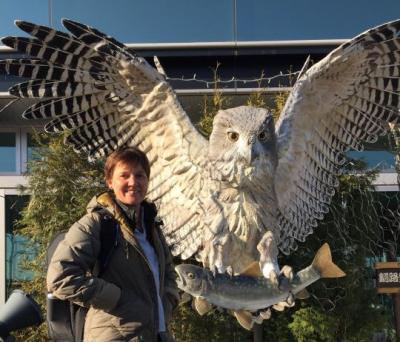
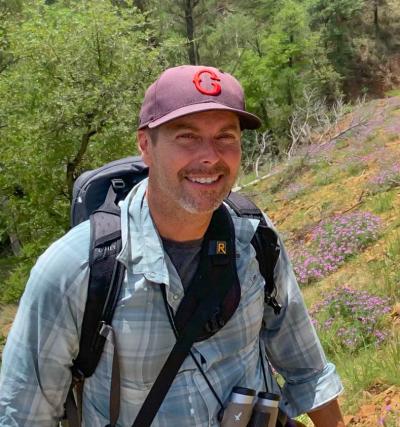
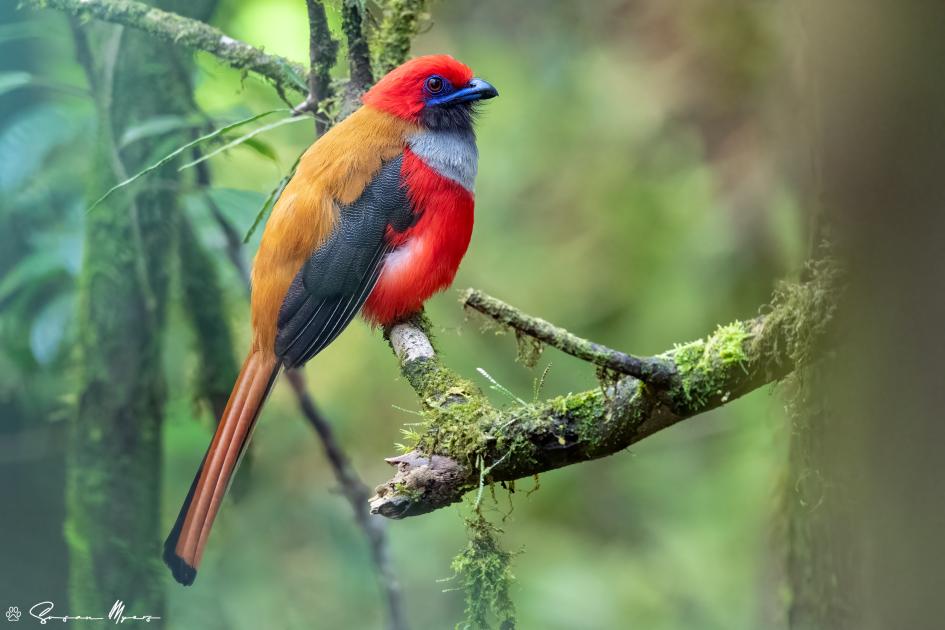
-(Susan)-facebook.jpg)
